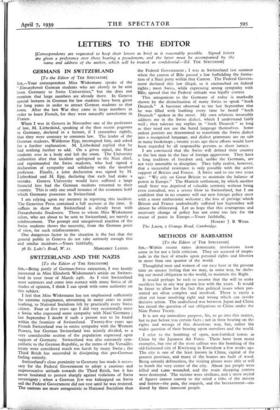SWITZERLAND AND THE NAZIS
[To the Editor of THE SPECTATOR]
Sta,—Being partly of German-Swiss extraction, I was keenly interested in Miss Elizabeth Wiskemann's article on Switzer- land in your issue of March z4th. As I visit Switzerland most summers and come into contact with many Swiss of all shades of opinion, I think I can speak with some authority on this subject.
I feel that Miss Wiskemann has not emphasised sufficiently the extreme repugnance, amounting in many cases to acute loathing, to National Socialism felt by practically every Swiss citizen. Four or five years ago I did very occasionally meet a Swiss who expressed some sympathy with Nazi*Germany ; last September I doubt if such a person was to be found within the frontiers of Switzerland. Twenty-five years ago French Switzerland was in entire sympathy with the Western Powers, but German Switzerland was acutely divided, as a very considerable section of the population expressed open support of Germany. Switzerland was also extremely sym- pathetic to the German Republic, as the terms of the Versailles treaty were considered much too harsh by many Swiss ; the Third Reich has succeeded in dissipating this pro-German feeling entirely.
Switzerland's close proximity to Germany has made it neces- sary for the Federal Government to adopt a cautious and unprovocative attitude towards the Third Reich, but it has never hesitated to protest sharply against violations of Swiss sovereignty ; when a German Jew was kidnapped on Swiss soil the Federal Government did not rest until he was restored. The cantons are more antagonistic to National Socialism than the Federal Government ; I was in Switzerland last summer when the canton of Bale passed a law forbidding the forma- tion of a Nazi party within that Canton. The Federal Govern- ment declared this law illegal, as it encroached on federal rights ; most Swiss, while expressing strong sympathy with Bale, agreed that the Federal attitude was legally correct.
This antagonism to the Germany of today is markedly shown by the disinclination of many Swiss to speak " hoch Deutsch." A barrister observed to me last September that he was filled with loathing every time he heard " hoc.h Deutsch " spoken in the street. My own relations invariably address me in the Swiss dialect, which I understand fairly well ; they tolerate my replies in " hoch Deutsch " as long as they need not use the hated language themselves. Some ardent patriots are determined to transform the Swiss dialect into a recognised language, and dialect grammars are on sale in many bookshops ; twenty years ago these efforts would have been regarded by all responsible persons as sheer lunacy.
I am convinced that the Swiss will defend their country to the last man in the face of foreign aggression. They have a long tradition of freedom and, unlike the Germans, are not very amenable to discipline. They fully realise, however, that a successful resistance is only possible with the active support of Britain and France. A Swiss said to me two years ago : " We rely on Great Britain to maintain the balance of power in Europe." The Munich settlement, by which another small State was deprived of valuable territory without being even consulted, was a severe blow to Switzerland, but I am confident that in no country will our new foreign policy meet with a more enthusiastic welcome ; the loss of prestige which Britain and France undoubtedly suffered last September will almost be obliterated. Let us hope that this courageous and necessary change of policy has not come too late for the rescue of peace in Europe.—Yours faithfully,










































 Previous page
Previous page